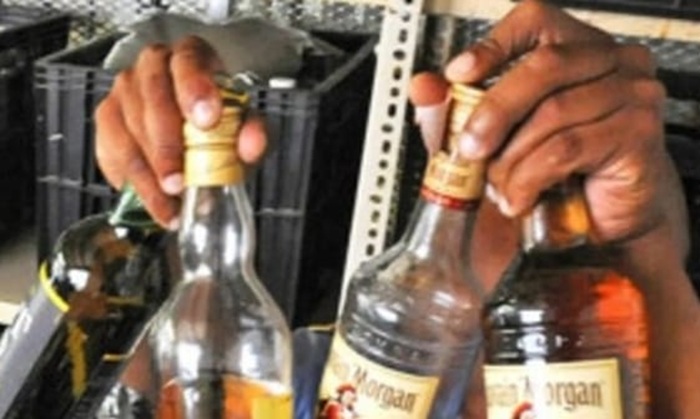Alcohol Bottles Seized in Shopian – Illegal Liquor Trade Threatens Kashmir’s Cultural Integrity
By: Javid Amin | 14 Aug 2025
A Disturbing Discovery in the Heart of Kashmir
In the serene valleys of South Kashmir, where rivers whisper through pine forests and traditions run deep, a troubling incident has shaken the conscience of the region. Over 1000 bottles of alcohol were discovered in non-local tents near Rambiyar Nala, Shopian—a place known more for its natural beauty than criminal activity.
This isn’t just a story about illegal liquor. It’s a story about cultural erosion, public health risks, and the growing disconnect between local values and external influences. As Kashmir grapples with political uncertainty, environmental degradation, and economic challenges, this incident adds another layer of concern.
The Raid: How Authorities Uncovered the Liquor Cache
Location: Rambiyar Nala, Shopian
Rambiyar Nala is a pristine water stream that flows through Shopian, often frequented by tourists and locals alike. In recent months, however, the area has seen a rise in temporary settlements, particularly tents occupied by non-local laborers and vendors.
The Operation
Acting on a tip-off from vigilant locals, law enforcement agencies conducted a surprise raid on these tents. What they found was staggering:
- Over 1000 bottles of alcohol, both sealed and unsealed
- Hidden compartments and makeshift storage units
- Evidence suggesting intent to distribute the liquor locally
Legal Implications
Alcohol is prohibited in many parts of Kashmir, especially in Muslim-majority districts like Shopian. The possession and distribution of liquor violate multiple sections of the Jammu & Kashmir Excise Act, and could lead to imprisonment, fines, and deportation of non-local offenders.
Cultural Impact: Why This Matters to Kashmir’s Identity
Religious Sentiment
Kashmir’s cultural ethos is deeply rooted in Islamic values, where alcohol consumption is not only frowned upon but considered a moral transgression. The presence of such large quantities of liquor near a public space is seen as a direct affront to local customs.
Community Voices
Locals expressed outrage, with many calling for:
- Immediate deportation of the offenders
- Stricter surveillance of transient populations
- Community-led monitoring of ecologically sensitive zones
A Larger Pattern?
This isn’t an isolated incident. It fits into a troubling pattern of external influences disrupting local harmony—from synthetic food products to counterfeit medicines, and now, illegal liquor.
Environmental Concerns: Rambiyar Nala Under Threat
Ecological Sensitivity
Rambiyar Nala is not just a stream—it’s a lifeline for biodiversity, supporting flora, fauna, and local agriculture. The presence of alcohol bottles, plastic waste, and human encampments poses a serious threat to:
- Water purity
- Soil health
- Tourism sustainability
Call for Cleanup
Environmental activists are urging authorities to:
- Conduct a thorough cleanup drive
- Impose eco-protection zones
- Ban unauthorized camping near water bodies
Public Health Risks: Beyond Alcohol
A Toxic Cocktail
The discovery of alcohol bottles is part of a broader public health crisis in Kashmir. Recent months have seen:
- Rotten meat sold in markets
- Synthetic milk laced with harmful chemicals
- Duplicate medicines circulating in pharmacies
Health Experts Warn
Doctors and nutritionists warn that these products can lead to:
- Liver damage
- Kidney failure
- Neurological disorders
- Long-term developmental issues in children
Public Reaction: Outrage, Activism, and Hashtag Campaigns
Social Media Erupts
Within hours of the raid, hashtags began trending:
- #DrugFreeKashmir
- #SaveShopian
- #StopPoisoningKashmir
- #CulturalSanctityUnderAttack
Influencers & Journalists Speak Out
Local influencers, journalists, and activists have taken to platforms like YouTube, Instagram, and X (formerly Twitter) to amplify the issue. Notable coverage includes:
What Needs to Be Done: Policy, Policing, and Public Engagement
Policy Recommendations
- Ban unauthorized encampments near ecologically sensitive zones
- Mandatory registration of non-local laborers and vendors
- Community policing models to empower locals
- Excise department reform to prevent liquor trafficking
Law Enforcement
- Increase patrol frequency in vulnerable zones
- Use drone surveillance for remote monitoring
- Create anonymous tip lines for locals to report suspicious activity
Public Engagement
- Launch awareness campaigns in schools and mosques
- Promote cultural pride through storytelling and tourism
- Encourage youth activism via social media and art
Editorial Perspective: Kashmir Must Not Become a Dumping Ground
As a senior editor and campaigner, I see this incident not just as a law-and-order issue, but as a symbol of deeper societal erosion. Kashmir is being treated like a dumping ground for toxic products, whether it’s fake food, harmful drugs, or now, illegal liquor.
This must stop.
We need a unified front—media, civil society, religious leaders, and policymakers—working together to preserve Kashmir’s dignity, health, and cultural integrity.
📚 Conclusion: A Moment of Reckoning
This incident is a wake-up call. It’s time to reclaim Kashmir’s values, protect its environment, and safeguard its people from external exploitation. The seizure of 1000 alcohol bottles is not just a headline—it’s a symbol of resistance, a call to action, and a reminder that Kashmir’s soul must not be compromised.


